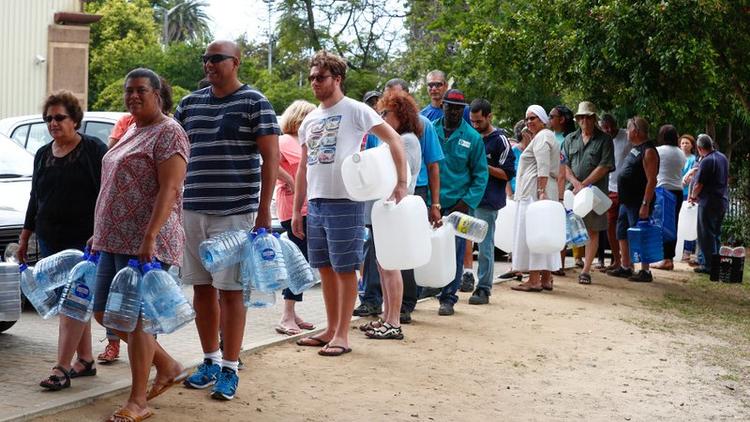
(单词翻译:单击)
听力文本
Much Publicized ‘Day Zero’ Changed Cape Town Forever
In January, officials in Cape Town, South Africa warned that the city's usable water supply would be gone by April 21. The heavily-publicized date was called "Day Zero."
The city on South Africa's southwestern coast has been fighting the worst drought in a century. Cape Town is home to more than four million people.
Earlier this month, officials canceled the prediction for Day Zero. They now said it would not take place until 2019. The action came after drops in dam levels decreased and rainfall was expected to arrive in coming months.
Severe water restrictions remain in place for the city. Each Cape Town individual is limited to 50 liters of water each day. Officials have said the restrictions will continue until water supplies rise to acceptable levels.
The water crisis has left a lasting mark on Cape Town. The public has learned valuable lessons in water saving and administration.
Claire Pengelly works for Green Cape, a not-for-profit group that has advised city officials through the long drought. She said some people have praised the delay of Day Zero, saying efforts to deal with the drought have worked.
"We've been able to save, and it means that we will get through this summer," she said.
However, Pengelly added, other people think they were tricked. They believe, she said, that Day Zero was a marketing campaign. Officials launched it, they argue, to get people to change behaviors although the city was never in real danger of complete water loss.
Pengelly said she thinks the threat of Day Zero turned out to be a good thing because it showed people the great need to conserve. She noted that even once the threat of Day Zero passed, overall water usage did not rise in Cape Town.
Deputy Mayor Ian Neilson has defended the city's decision in January to declare April 21 would be Day Zero. He said at the time, water usage in the city was still at a very high level. Only after stronger restrictions were ordered did the situation turn around.
Claire Pengelly said she has learned to live with one-minute showers and other water-saving measures at home. But she also said she dreams of a day when she can once again take a long, hot bath – something she has not done in over a year.
I'm Bryan Lynn.
重点解析
1.water supply 水源
Cleaning up the water supply is their top priority.
清洁供水系统是他们的当务之急。
2.once again 再一次
Once again I breathed as a free man.
我又能像个自由人一样呼吸了。
3.remain in place 仍然生效
For this reason some controls will remain in place.
出于这一原因,一些限制措施将继续存在。
4.water loss 水资源浪费
Land resources are dwindling because of water loss and soil erosion.
因为水资源的浪费和土壤被侵蚀,土地资源逐渐缩小。
5.Officials launched it, they argue, to get people to change behaviors although the city was never in real danger of complete water loss.
in danger of 处于...危机
He was in danger of making a real cock-up of this.
他很有可能会把这事弄得一团糟。
Britain's university system is in danger of falling apart at the seams.
英国的大学体系面临分崩离析的危险。
6.Only after stronger restrictions were ordered did the situation turn around.
turn around 转身;好转(情况)
Bud turned the truck around, and started back for Dalton Pond.
巴德把卡车掉头,开始返回多尔顿池。
Turning the company around won't be easy.
盘活那家公司绝非易事。
参考译文
“零水日”永远改变了开普敦
今年1月份,南非开普敦官员警告称,该市的可用水供应将于4月21日切断。这一天被称为“零水日”。
这座位于南非西南海岸的城市正在对抗一个世纪以来最严重的旱情。开普敦的人口超过400万。
本月初,官员取消了对“零水日”的预测。他们现在表示,这一天在2019年才会发生。此前,大坝水位下降,预计未来几个月会出现降雨。
但是开普敦仍然存在严格的用水限制。开普敦每人每天限制用水50升。官员们表示,用水限制会延续到水供应达到可接受的水平。

水危机给开普敦留下了深远的影响。公众在节约用水和水资源管理方面吸取了宝贵的经验教训。
克莱尔·彭盖利(Claire Pengelly)任职于“绿色开普敦”——一家非营利组织,在长期的抗旱斗争中为市政府提供相关建议和意见。她说,有民众称赞推迟“零水日”,表明抗旱所做的努力初见成效。
“我们能够挽救如今的困境,这意味着我们将安然渡过今年夏天,”她说。
然而,彭盖利补充说,其他人觉得被欺骗了。她指出,他们认为,“零水日”只是营销活动。他们坚称,是官方发起了这项活动,让人们改变用水行为,虽然开普敦从未真正面临彻底断水的危机。
彭盖利还表示,她觉得事实证明了“零水日”威胁是一件好事,因为它表明水资源急需人类的保护。她指出,即使“零水日”的威胁结束,开普敦的整体用水量也没有增加。
对于该市1月份宣布4月21日为“零水日”的决定,副市长伊恩·尼尔森(Ian Neilson)表示支持。他当时解释称,该市用水量仍然处于非常高的水平。只有在出台更为严格的用水限令后,情况才会好转。
彭盖利表示,她学会了如何在家里用一分钟淋浴以及其他节水措施。但她也表示,梦想有一天实现一年以来的愿望——洗个长时间的热水澡。
布莱恩·林恩为您播报。
译文为翻译,未经授权请勿转载!
